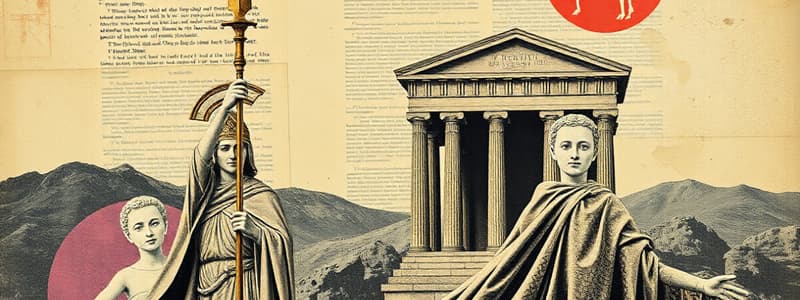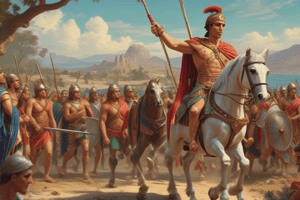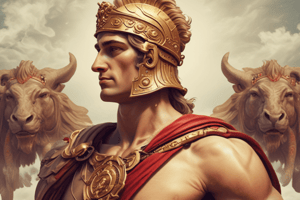Podcast
Questions and Answers
How did the rule of Pontius Pilate differ from that of the procurators who governed Judah between 6 CE and 26 CE, and what was the result of his actions?
How did the rule of Pontius Pilate differ from that of the procurators who governed Judah between 6 CE and 26 CE, and what was the result of his actions?
Unlike his predecessors, Pontius Pilate was a harsh ruler who imposed heavy taxes and disrespected Jewish religious customs, leading to increased tension and resentment among the Jewish population. He also crucified Jesus.
What critical decision was made in 6 CE by a group of Pharisees and what impact did this decision have on the governance of Judah?
What critical decision was made in 6 CE by a group of Pharisees and what impact did this decision have on the governance of Judah?
In 6 CE, a delegation of Pharisees traveled to Rome and requested the removal of Herod's dynasty. This led to Judah becoming a Roman province.
Describe the actions taken by Simon, the brother of Judah Maccabee, to consolidate Jewish autonomy following the Maccabean Revolt.
Describe the actions taken by Simon, the brother of Judah Maccabee, to consolidate Jewish autonomy following the Maccabean Revolt.
Simon became the leader and high priest, and was elected as president by the assembly. He successfully gained independence from the Greeks for the Jewish people.
Explain how John Hyrcanus expanded Hasmonean territory and discuss associated controversy.
Explain how John Hyrcanus expanded Hasmonean territory and discuss associated controversy.
What factors led to the Pharisees' opposition to Aristobulus, and what did these factors reveal about the evolving nature of Hasmonean rule?
What factors led to the Pharisees' opposition to Aristobulus, and what did these factors reveal about the evolving nature of Hasmonean rule?
How did Alexander Yanai's dual role as both priest and king influence the expansion of the Hasmonean kingdom, and what potential conflicts did this dual role create?
How did Alexander Yanai's dual role as both priest and king influence the expansion of the Hasmonean kingdom, and what potential conflicts did this dual role create?
How did the actions of Jonathan contribute to the rise of the Hasmonean Dynasty, and what ultimately led to his death?
How did the actions of Jonathan contribute to the rise of the Hasmonean Dynasty, and what ultimately led to his death?
Describe the sequence of events that marked the downfall of Judea, starting with the outbreak of the great revolt and ending with the fall of Masada.
Describe the sequence of events that marked the downfall of Judea, starting with the outbreak of the great revolt and ending with the fall of Masada.
Describe how Jason's actions as high priest contributed to the growing tensions that led to the Maccabean revolt.
Describe how Jason's actions as high priest contributed to the growing tensions that led to the Maccabean revolt.
Explain the significance of Antiochus placing a statue of Zeus in the Temple on the 25th of Kislev, 168 BCE.
Explain the significance of Antiochus placing a statue of Zeus in the Temple on the 25th of Kislev, 168 BCE.
What motivated Mattathias to leave Jerusalem and move to Modein?
What motivated Mattathias to leave Jerusalem and move to Modein?
How did Menelaus's actions as high priest further undermine Jewish autonomy and religious practices?
How did Menelaus's actions as high priest further undermine Jewish autonomy and religious practices?
Summarize the key reasons for the revolt against the Greeks, as highlighted in the text.
Summarize the key reasons for the revolt against the Greeks, as highlighted in the text.
Explain the significance of Mattathias's call, "Let everyone who is zealous for the law and who stands by the covenant - Follow me!"
Explain the significance of Mattathias's call, "Let everyone who is zealous for the law and who stands by the covenant - Follow me!"
Describe the role of the Hassidim in the events leading up to the Maccabean revolt.
Describe the role of the Hassidim in the events leading up to the Maccabean revolt.
How did Antiochus's decrees forbidding Jewish practices contribute to the revolt?
How did Antiochus's decrees forbidding Jewish practices contribute to the revolt?
Explain how Alexander the Great’s acceptance of local practices in conquered lands contributed to the spread of Hellenistic culture.
Explain how Alexander the Great’s acceptance of local practices in conquered lands contributed to the spread of Hellenistic culture.
Describe the significance of the Septuagint for the Jewish community in Alexandria and future generations.
Describe the significance of the Septuagint for the Jewish community in Alexandria and future generations.
How did the architecture and practices within the Great Synagogue in Alexandria reflect the influence of Hellenism on Jewish life?
How did the architecture and practices within the Great Synagogue in Alexandria reflect the influence of Hellenism on Jewish life?
Explain how Jason's actions as high priest under Antiochus IV contributed to the Maccabean Revolt.
Explain how Jason's actions as high priest under Antiochus IV contributed to the Maccabean Revolt.
In what ways did Alexander the Great's conquest of Judah differ from subsequent rule under leaders like Antiochus?
In what ways did Alexander the Great's conquest of Judah differ from subsequent rule under leaders like Antiochus?
What strategic advantage did controlling Judah offer to the Seleucid and Ptolemaic kingdoms after Alexander's death?
What strategic advantage did controlling Judah offer to the Seleucid and Ptolemaic kingdoms after Alexander's death?
How did the needs of the Jewish community in Alexandria lead to the creation of the Septuagint, and what does this tell us about the relationship between language and cultural preservation?
How did the needs of the Jewish community in Alexandria lead to the creation of the Septuagint, and what does this tell us about the relationship between language and cultural preservation?
Describe the delicate balance the Jews living in Alexandria had to strike between Hellenism and their own culture.
Describe the delicate balance the Jews living in Alexandria had to strike between Hellenism and their own culture.
How did Alexander Yannai's actions during the Sukkot festival reflect the tensions between him and the Pharisees?
How did Alexander Yannai's actions during the Sukkot festival reflect the tensions between him and the Pharisees?
What was the significance of Salome Alexandra's reign in relation to the Pharisees and how did it differ from her husband's?
What was the significance of Salome Alexandra's reign in relation to the Pharisees and how did it differ from her husband's?
What were the main criticisms of the Hasmonean rulers by the Pharisees?
What were the main criticisms of the Hasmonean rulers by the Pharisees?
In what ways did Herod attempt to legitimize his rule, and how did his actions also undermine his legitimacy?
In what ways did Herod attempt to legitimize his rule, and how did his actions also undermine his legitimacy?
Why did Alexander Yannai advise his wife, Salome Alexandra, to make peace with the Pharisees before his death?
Why did Alexander Yannai advise his wife, Salome Alexandra, to make peace with the Pharisees before his death?
How did the combination of the roles of king and high priest by the Hasmonean rulers contribute to the conflict with the Pharisees?
How did the combination of the roles of king and high priest by the Hasmonean rulers contribute to the conflict with the Pharisees?
What motivated Herod to travel to Rome and persuade the senators to appoint him as king of Judah?
What motivated Herod to travel to Rome and persuade the senators to appoint him as king of Judah?
Why was Herod paranoid and obsessed with someone taking his crown, and how did this affect his actions?
Why was Herod paranoid and obsessed with someone taking his crown, and how did this affect his actions?
Explain how Herod's building projects, while initially beneficial to the Jewish people through increased employment, ultimately contributed to economic grievances that fueled the Great Revolt against the Romans.
Explain how Herod's building projects, while initially beneficial to the Jewish people through increased employment, ultimately contributed to economic grievances that fueled the Great Revolt against the Romans.
Compare and contrast the Pharisees' and Sadducees' views on Hellenism and how these differing perspectives influenced their stances on the revolt against the Romans.
Compare and contrast the Pharisees' and Sadducees' views on Hellenism and how these differing perspectives influenced their stances on the revolt against the Romans.
Describe the role of a Roman procurator in Judea, and provide two specific examples from the text of actions taken by procurators that incited the Jewish population and contributed to the Great Revolt.
Describe the role of a Roman procurator in Judea, and provide two specific examples from the text of actions taken by procurators that incited the Jewish population and contributed to the Great Revolt.
How did Herod's personal life, specifically his marriage to Miriami and his subsequent actions towards her and her family, reflect and contribute to the internal tensions within Judean society during his reign?
How did Herod's personal life, specifically his marriage to Miriami and his subsequent actions towards her and her family, reflect and contribute to the internal tensions within Judean society during his reign?
Explain why the end of Herod's building projects led to increased unemployment among the Jewish population, and how this contributed to the growing unrest against Roman rule.
Explain why the end of Herod's building projects led to increased unemployment among the Jewish population, and how this contributed to the growing unrest against Roman rule.
Discuss the significance of the Pharisees' belief in the Oral Torah, and how this belief distinguished them from the Sadducees and influenced their approach to Jewish law and tradition.
Discuss the significance of the Pharisees' belief in the Oral Torah, and how this belief distinguished them from the Sadducees and influenced their approach to Jewish law and tradition.
Describe how Herod’s decision to build a port city in Caesarea, populated by non-Jews, reflect the wider tensions between the Jewish and non-Jewish populations during his reign and how this contributed to instability.
Describe how Herod’s decision to build a port city in Caesarea, populated by non-Jews, reflect the wider tensions between the Jewish and non-Jewish populations during his reign and how this contributed to instability.
How did the political goals of the Jewish people contribute to the Great Revolt against the Romans?
How did the political goals of the Jewish people contribute to the Great Revolt against the Romans?
Describe the main conflict between the Pharisees and the Zealots during the Roman siege of Jerusalem, and explain how this conflict impacted the city's resources.
Describe the main conflict between the Pharisees and the Zealots during the Roman siege of Jerusalem, and explain how this conflict impacted the city's resources.
Explain the Sicarii's motivation for their final act at Masada, and how they carried out this act. What does leaving the untouched food supplies reveal about the Roman's understanding of the situation?
Explain the Sicarii's motivation for their final act at Masada, and how they carried out this act. What does leaving the untouched food supplies reveal about the Roman's understanding of the situation?
Summarize the story of Kamtza and Bar Kamtza. What action by Bar Kamtza ultimately incited conflict between the Romans and the Jews, and how?
Summarize the story of Kamtza and Bar Kamtza. What action by Bar Kamtza ultimately incited conflict between the Romans and the Jews, and how?
What was the primary moral lesson to be learned from the story of Kamtza and Bar Kamtza?
What was the primary moral lesson to be learned from the story of Kamtza and Bar Kamtza?
Relate the actions of one of the following to the destruction of the second Temple: Bar Kamtza, the Zealots, the Pharisees.
Relate the actions of one of the following to the destruction of the second Temple: Bar Kamtza, the Zealots, the Pharisees.
How might the internal divisions among the Jews in Jerusalem—specifically between the Pharisees and Zealots—have made it easier for the Romans to ultimately breach the city's defenses?
How might the internal divisions among the Jews in Jerusalem—specifically between the Pharisees and Zealots—have made it easier for the Romans to ultimately breach the city's defenses?
If the sages present at the party had intervened when Bar Kamtza was initially humiliated, how might the subsequent events, including the conflict with the Romans, have been altered? Explain your reasoning.
If the sages present at the party had intervened when Bar Kamtza was initially humiliated, how might the subsequent events, including the conflict with the Romans, have been altered? Explain your reasoning.
Compare the motivations of the Zealots at Masada with those of Bar Kamtza. Were their actions driven by similar goals or different principles? Explain.
Compare the motivations of the Zealots at Masada with those of Bar Kamtza. Were their actions driven by similar goals or different principles? Explain.
Flashcards
Antiochus Decrees
Antiochus Decrees
Laws imposed to Hellenize the Jews, prohibiting Torah study, Shabbat, and circumcision.
Jason's Role
Jason's Role
High priest appointed by Antiochus to promote Hellenism in Jerusalem.
Menelaus
Menelaus
Bribed Antiochus to become high priest, leading to corruption and riots.
Riots in Jerusalem
Riots in Jerusalem
Signup and view all the flashcards
Statue of Zeus (168 BCE)
Statue of Zeus (168 BCE)
Signup and view all the flashcards
Hassidim
Hassidim
Signup and view all the flashcards
Matitiahu
Matitiahu
Signup and view all the flashcards
Reasons for Revolt
Reasons for Revolt
Signup and view all the flashcards
Hellenism
Hellenism
Signup and view all the flashcards
Alexander the Great
Alexander the Great
Signup and view all the flashcards
Septuagint
Septuagint
Signup and view all the flashcards
Polis
Polis
Signup and view all the flashcards
Seleucid Empire
Seleucid Empire
Signup and view all the flashcards
Antiochus
Antiochus
Signup and view all the flashcards
Jason
Jason
Signup and view all the flashcards
Great Synagogue in Alexandria
Great Synagogue in Alexandria
Signup and view all the flashcards
Alexander Yanai
Alexander Yanai
Signup and view all the flashcards
Salome Alexandra
Salome Alexandra
Signup and view all the flashcards
Pharisees
Pharisees
Signup and view all the flashcards
Hasmonean rule
Hasmonean rule
Signup and view all the flashcards
Civil war of Hyrcanus II and Aristobulus II
Civil war of Hyrcanus II and Aristobulus II
Signup and view all the flashcards
Pompey
Pompey
Signup and view all the flashcards
Herod's paranoia
Herod's paranoia
Signup and view all the flashcards
Herod's kingship
Herod's kingship
Signup and view all the flashcards
Herod's Reign
Herod's Reign
Signup and view all the flashcards
Judah as Roman Province
Judah as Roman Province
Signup and view all the flashcards
Pontius Pilate
Pontius Pilate
Signup and view all the flashcards
Crucifixion of Jesus
Crucifixion of Jesus
Signup and view all the flashcards
Great Revolt
Great Revolt
Signup and view all the flashcards
Destruction of the Second Temple
Destruction of the Second Temple
Signup and view all the flashcards
John Hyrcanus
John Hyrcanus
Signup and view all the flashcards
Aristobulus
Aristobulus
Signup and view all the flashcards
Herod's City Building
Herod's City Building
Signup and view all the flashcards
Procurator Role
Procurator Role
Signup and view all the flashcards
Great Revolt Causes
Great Revolt Causes
Signup and view all the flashcards
Sadducees
Sadducees
Signup and view all the flashcards
Essenes
Essenes
Signup and view all the flashcards
Miriami
Miriami
Signup and view all the flashcards
Impact of Herod's Projects
Impact of Herod's Projects
Signup and view all the flashcards
Zealots
Zealots
Signup and view all the flashcards
Sicarii
Sicarii
Signup and view all the flashcards
Masada
Masada
Signup and view all the flashcards
Civil War in Jerusalem
Civil War in Jerusalem
Signup and view all the flashcards
Bar Kamtza's Revenge
Bar Kamtza's Revenge
Signup and view all the flashcards
Unjustified Hatred
Unjustified Hatred
Signup and view all the flashcards
Food Storage Burning
Food Storage Burning
Signup and view all the flashcards
Study Notes
The Greek Period
- Hellenism is a blend of Greek and Eastern Persian culture.
- Alexander the Great was from Macedonia.
- He conquered Persia, turning Greece into an empire.
- He spread Greek language and culture to conquered lands, incorporating local practices.
- Alexander conquered Judah in 332 BCE.
- He treated the Jews kindly and granted them autonomy.
- Alexander's empire was divided after his death in 323 BCE, among the Seleucid and Ptolemaic kingdoms.
The Septuagint
- The Septuagint is a translation of the Torah from Hebrew to Greek.
- Legend attributes its creation to 72 Jewish elders.
- The Septuagint was needed by Alexandrian Jews who did not speak Hebrew.
- It was crucial for the Jewish community, accessible in the army and future generations.
Polis
- "Polis" refers to a Greek city-state.
Seleucus
- Seleucus, a brother of Alexander the Great, founded the Seleucid Empire.
- The empire controlled parts of Syria, Iraq, and Persia after Alexander's death.
The Great Synagogue in Alexandria
- It was a large synagogue, adorned with Greek columns (colonnades).
- The synagogue embodied Hellenistic influence.
- The use of a scarf by the leader served as a signal for the next part of the prayer service for people who did not know Hebrew because they had been Hellenized.
Studying That Suits You
Use AI to generate personalized quizzes and flashcards to suit your learning preferences.




